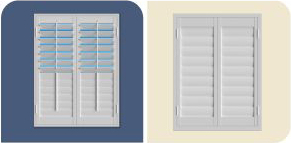
3 Ways Polywood Shutters Are Better Than Hollow Vinyl And Composite Shutters In Philadelphia, PA
December 15, 2015
Plantation shutters in Philadelphia come with different options. And when you want to know which non-wood shutter is best for you, it’s not easy to distinguish the differences. You can easily make the wrong choice and end up ordering shutters that aren’t durable. When it comes to solid polymer shutters, like our best-selling Polywood® shutters, are they a better investment than hollow vinyl or MDF (multi-density fiberboard) shutters? Here are three ways Polywood shutters are a better choice than composite shutters in Philadelphia, PA to help you decide.
1. Polywood vs Composite Shutters Durability
Polywood shutters are made from a first class solid polymer that results in the most rigidity, color-retention, and durability than any other shutter money can buy. This means the shutter louvers won't be damaged over time. In contrast, composite shutters are fabricated from a pressed-board core, encapsulated in poly-vinyl. The vinyl enveloping the pressed board is prone to peeling from the core substance readily. And this peeling is expedited in humid, wet, and hot surroundings. Hollow vinyl shutters are another option for non-wood shutters. But they degrade the fastest due to the material.Both types of non-wood shutters are vulnerable to warping and deterioration under varying environmental conditions in Philadelphia. Polywood is crafted with UV inhibitors that deflect heat. And since heat is the leading offender in chipping the shutter louvers, Polywood is without a doubt the longest lasting plantation shutter you can find.
2. Polywood vs Composite Shutters Color Fastness
Polywood shutters colors include three superior white paints. We bake these paint finishes on each part at temperatures hotter than it will ever get in Philadelphia, PA. This patented finishing process uses UV inhibitors and ensures the color doesn’t fade.
Other types of non-wood shutters come with low quality paint finish. And some composite shutters won’t even have any paint finish at all. In a lot of cases, the vinyl wrap is the all the color you get. This finish may look good initially, but it fades over time. And some hollow vinyls are painted. However, with the material easily conducting heat, this seriously affects the finish over time.
3. Polywood vs Composite Shutters Energy Efficiency
Third party tests illustrate that Polywood shutters result in a reduction of heat transfer by up to 45% and block up to 30° of temperature. This means that Polywood insulates up to 70% better than even the best solid wood shutter.
These insulating properties are due to the solid polymer material Polywood shutters are made from. But what sets Polywood apart even more from composite shutters is the weatherstripping on the louvers and panels. Just interlock the pieces of weatherstripping while closing the panels and you get an airtight seal against the weather conditions outside. No composite shutter can offer the energy savings that Polywood does.
Our Vegas Team’s First Hand Experience With The Durability Of Polywood Shutters
In 2004, Sunburst Shutters Las Vegas had Polywood shutters fastened to the sides of their trucks as part of the graphics. The trucks were parked outside and endured the climate Vegas is known for. That means intense heat for almost five months each year!
Those Polywood shutters had been attached to our trucks for at least 7 years. That’s when our team organized an investigation to see how effective Polywood is in retaining the original paint color. The team wiped the Polywood shutter that was on the truck clean. And we brought a new Polywood shutter and held it up next to it to compare. The color hadn’t changed one bit. We didn’t see any discoloration or fading. It further validated for our team that the Sunburst paint finish is indeed the best around!
And since Polywood can endure all that heat damage on the road for over 7 years, it’s undoubtedly the most durable shutter for your house in Philadelphia, PA.


